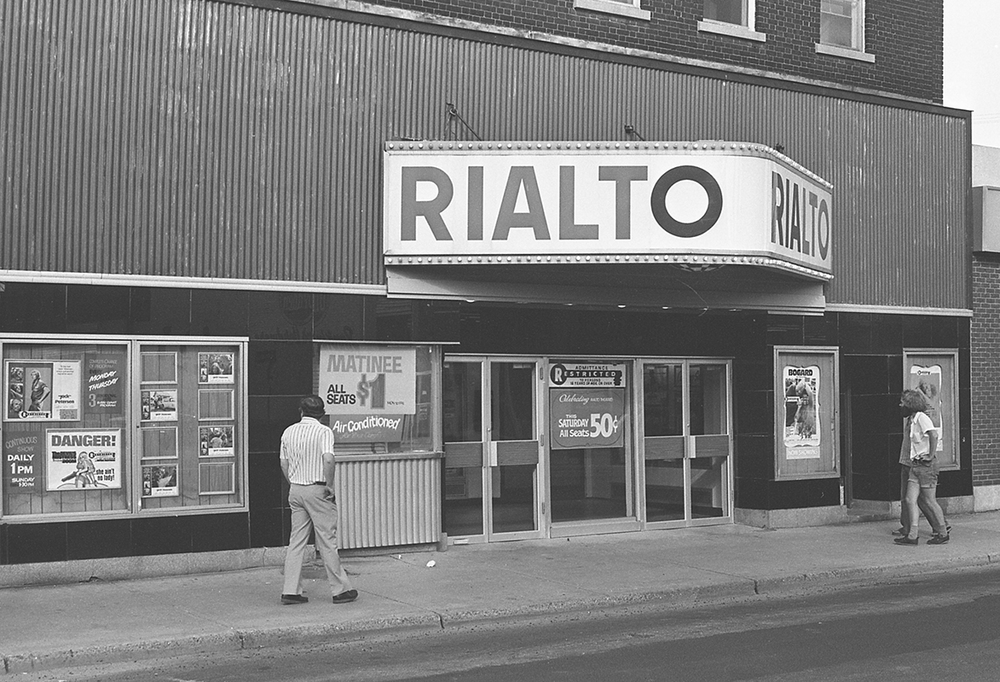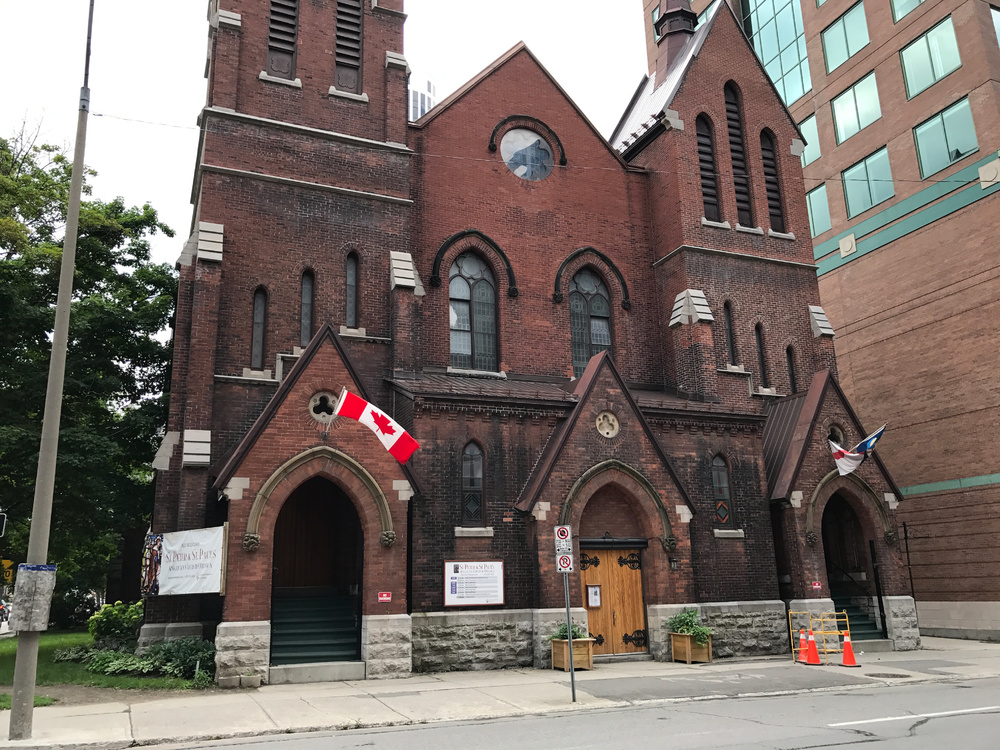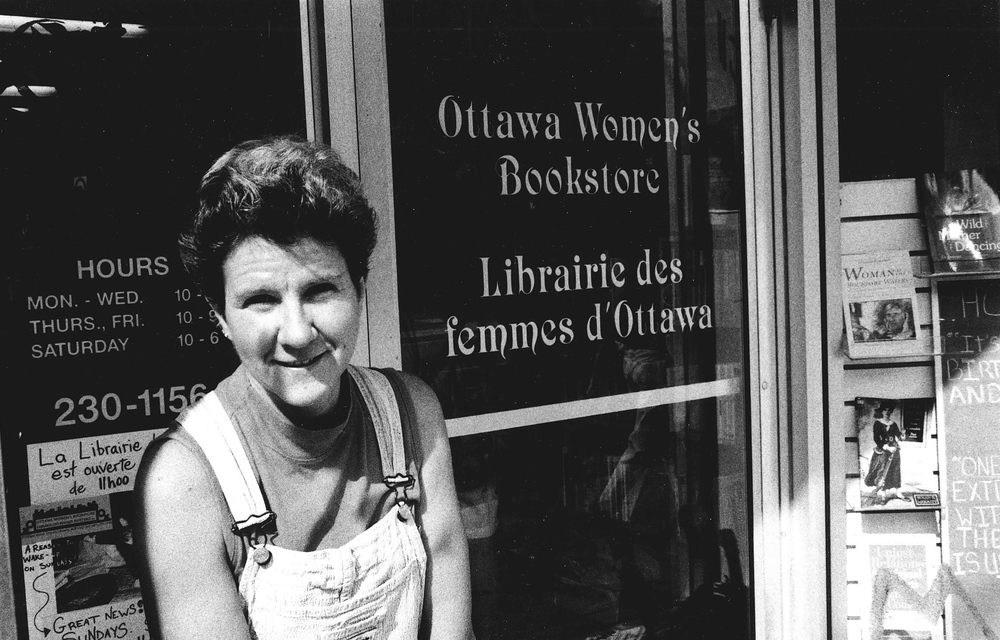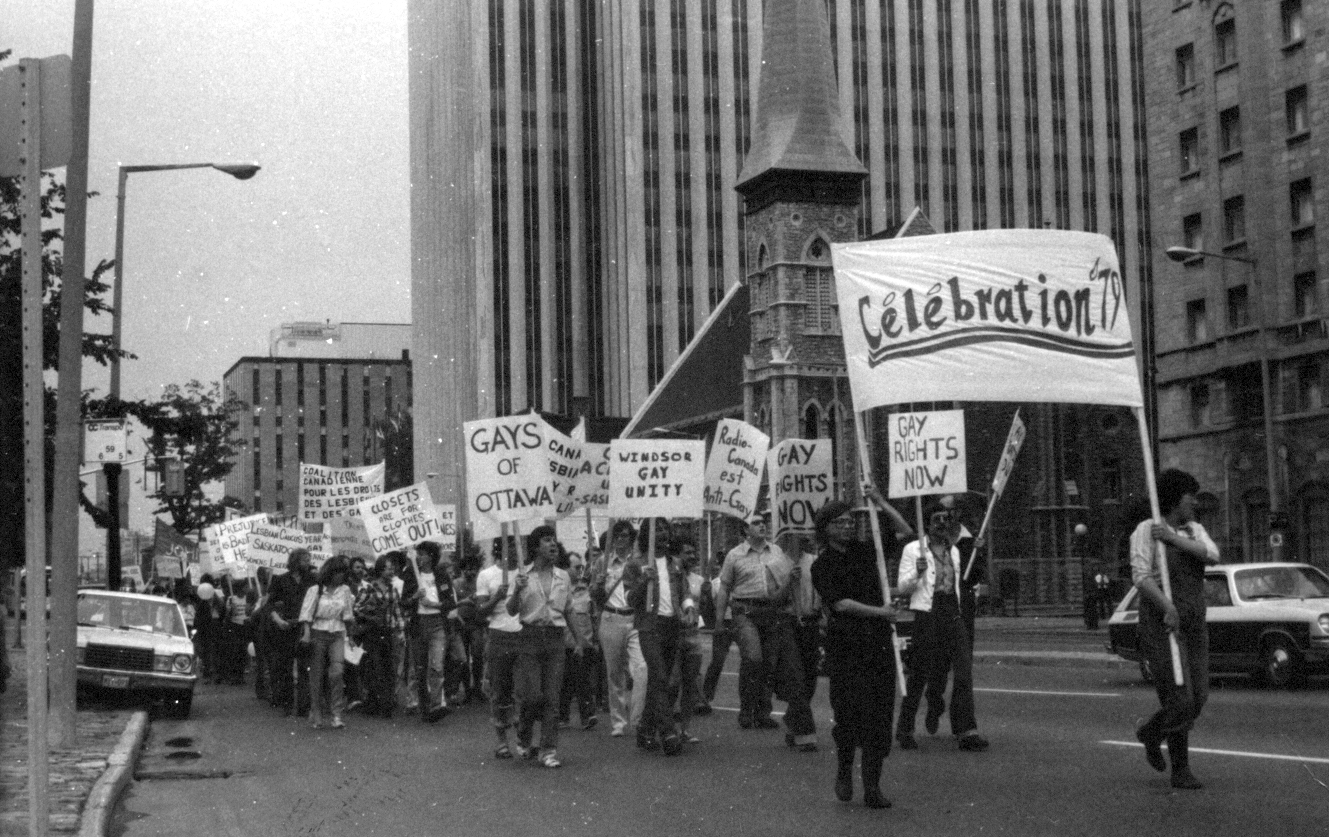This content was created by Xtra’s branded content team alongside Bank Street BIA, separate from Xtra’s editorial staff. Bank Street BIA's new initiative, the Village Legacy Project, is a collection of archival photographs, interviews and stories to celebrate and preserve Ottawa's queer history.
It wasn’t until 2011 that six rainbow street signs were put up along Bank Street in Canada’s capital — officially branding the length from Nepean and James streets as “the Village,” — but the street’s colourful history with the queer community can be traced back for decades. And a new project by the Bank Street Business Improvement Association (BIA) is attempting to do just that.
With some help from community members and a lot of research, The Village Legacy Project (VLP) is compiling information to highlight Ottawa’s LGBT culture and history through stories, photographs and an interactive walking tour. So we’ve pulled together a selection of establishments that helped lay the foundation for Ottawa’s current and future LGBT communities:
The Rialto Theatre
Long before LGBT communities were openly welcomed by most businesses, queer folks quietly found each other in less conspicuous venues. One of these was Ottawa’s Rialto Theatre. When it first opened in 1931, the theatre was considered an upscale venue along Bank Street; however, years of wear and tear, along with maintenance issues, left its mark on the theatre, which locals began calling “The Rat Hole.”

The Rialto Theatre was once a cruising spot for gay men. Credit: Courtesy City of Ottawa Archives CA025670
The theatre wasn’t explicitly queer, nor did it show X-rated films. Nonetheless, with few other options, gay men were known to frequent the Rialto throughout the 1950s to 1970s. The venue became a notorious hotspot in Ottawa’s cruising scene and as such, an important establishment for gay locals at the time.
The Rialto eventually suffered the same fate as many independent theatres and shut down in 1979, was later resurrected and rebranded by Cineplex theatres, and then eventually demolished in 1991.
The Lord Elgin Hotel
By the 1950s and 1960s an underground gay scene was thriving in downtown Ottawa, and the Lord Elgin Hotel was near the centre of it all. The hotel’s downstairs tavern, Pick’s Place, was a popular cruising area thanks to its less formal environment than other parts of the hotel. The tavern quickly developed a reputation as one of the city’s top gay hangouts, which unfortunately also drew the attention of city officials.
Undercover RCMP agents were also known to hang out in the tavern. During the government purges, agents would cut out holes in newspapers held in front of their faces and take photographs of men they suspected were gay. This was part of a larger nationwide effort to uncover gay and lesbian civil workers, which resulted in hundreds of people losing their jobs and thousands of names placed on RCMP lists.
In 1981 hotel management began closing the tavern early, essentially cutting off their gay clientele. This inspired some of the tavern’s staff to open their own establishment, known as 166B, just around the corner from the hotel. The newly formed bar, also known by regulars as “The B,” became Ottawa’s first official gay bar.
The GO Centre
Tired of how they were being treated, in August 1971 a group of roughly 200 gays and lesbians gathered on Parliament Hill and held Canada’s first public protest for gay rights, known as the We Demand demonstration. The demonstration lit a spark among Ottawa’s gay activists, and in the months that followed, a small group came together to form Gays of Ottawa (GO), the city’s first queer-rights organization. GO’s initial mandate was to lobby the government on behalf of gays and lesbians, act as a community organization and educate the mainstream community.
The group’s first meetings took place in private homes until GO landed in St George’s Church, meeting every second Tuesday. A year later the group had grown and moved to 160 Chapel St. The space was licensed, and GO was able to run larger events and dances for the local queer community. From here the group expanded operations: opening a peer-support line, a counselling centre, and publishing a monthly newsletter.

St George’s Church (Now St Peter and St Paul’s Anglican Church) hosted Gays of Ottawa meetings in the 1970s. Credit: Courtesy Glenn Crawford/Village Legacy Project
By 1976 more women were becoming involved in GO and they formed a separate organization called Lesbians of Ottawa Now (LOON). The group shared a space with GO, mainly operating as a social collective. That same year LOON organized the National Lesbian Conference.
Over the next decades GO changed locations many times, sometimes to accommodate growth, or due to issues with landlords and once because the centre mysteriously burned down. GO changed its name in 1989 to the Association of Lesbians and Gays (ALGO) and then again in 1993 to ALGBO to include the bisexual community. The group eventually shut down operations in 1995.

Peggy Harris co-founded the Ottawa Women’s Bookstore. Credit: Capital Xtra Archives
Ottawa Women’s Bookstore
On the heels of a booming women’s movement, co-founders Peggy Harris and Lee Fleming opened the Ottawa Women’s Bookstore in 1982. The store was one of the city’s few community spaces serving the lesbian and feminist communities, and became an important meeting place and source of information.
After a decade of operations, the bookstore closed, although its legacy lives on thanks to a few former employees. Evelyn Huer, Laura Rayner and Julie Gagnon opened Mother Tongue Books in 1992. Mother Tongue outlasted many other independent booksellers and enjoyed its own 20-year run, but eventually succumbed in 2012 to rising costs and a rapidly changing industry.

Charles Louis Blach founded Central Park (eventually named Centretown Pub). Credit: Courtesy Village Legacy Project
Centretown Pub
According to its former owners, when Centretown Pub (CP) first opened in 1984 the bar faced harsh opposition from some of its neighbours, who disliked queer gatherings and visibility. In its early years, the bar couldn’t keep its patio open due to people driving by and throwing eggs at the patrons.
Located at 340 Somerset St W, CP eventually built a loyal clientele who frequented the bar. It became known as a staple in Ottawa’s gay scene, hosting regular drag shows on Fridays and a monthly night for the Ottawa Knights leather group.
Rising operational costs and a decline in foot traffic caused CP to close abruptly in early 2017. After more than three decades in operation, it was Ottawa’s longest running gay bar.
After Stonewall and Wilde’s
In 2016 two of the city’s oldest surviving queer businesses, After Stonewall and Wilde’s, were facing rising costs and an increasingly tough retail environment.
After Stonewall was founded in 1990 by David Rimmer as one of Canada’s few LGBT bookstores. Its original location was a basement on Fourth Avenue. After outgrowing its location, the store moved a few times, settling at 370 Bank St. The store was put up for sale and reopened in 2013 under new management after some renovations.
Wilde’s opened in 1993 as a sex shop catering mainly to gay men. The store moved around the street a few times, never straying far from the heart of the city’s gay community. Wilde’s was sometimes subjected to scrutiny from bylaw officers who were squeamish about its racy storefront signs and attempted to censor some of them. The store eventually moved into the unoccupied space in the basement of 370 Bank, directly below After Stonewall.
The owners of both shops concluded the best way forward would be to merge the businesses, so they launched a crowdfunding campaign. The new business, now known as Stonewall Wilde’s, operates as an event space and houses the best of both shops — with gifts and art upstairs, and a men’s shop in the basement.
The Village Legacy Project
Available for download in the App Store and Google Play
villagelegacy.ca

 Why you can trust Xtra
Why you can trust Xtra